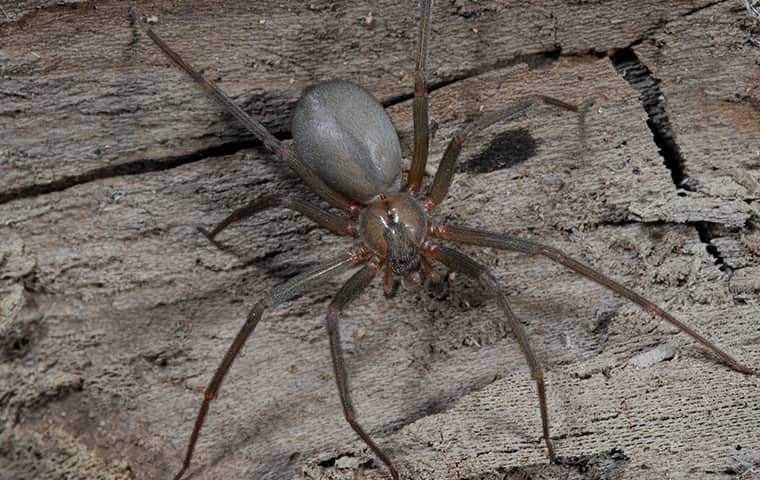Spiders are creepy and often mysterious houseguests. They can appear out of nowhere, zip down your wall, and disappear without a trace. You can walk into a room, find a giant hairy spider, and wonder how on earth that thing got inside! You can tap a spider with your foot and watch dozens of tiny spiders go running in every direction. You can watch a little spider repel from the ceiling right in front of you while you watch television. There are many different kinds of spiders in Denver and many ways you can run into them. The secret to keeping arachnids out of your home is understanding how different spiders behave and counteracting their natural behavior patterns. Today, we're going to share some fun facts with you about spider behavior and tie the behaviors to what you can do to spider-proof your home. You're sure to learn something new even if you've looked into spider control before. If you prefer to let spiders remain mysterious and you don't want to learn about these creepy eight-legged bugs, you can contact us for spider control and management. Absolute Pest Control offers professional pest control in Denver with many options to help you get spiders out and keep them out. Contact us through our contact page, text us, or just call. We're here to help.
Spider Behavior: How They Hunt, Feed, And Mate

Colorado house spiders come in many shapes and sizes, and we could write pages on each one. We could go into detail and explain that all spiders are arachnids but not all arachnids are spiders. We could tell you mysterious and creepy facts about arachnids, like the fact that some gather together into a ball and some carry their babies on their backs. In both cases, it isn't a good idea to poke a ball of spiders. But these facts won't help you keep spiders out of your home. Let's zero in on what you need to know about spider behavior that can give you a leg-up (or eight legs up) on those creepy invaders.
How Spiders Hunt: All spiders are predators with fangs and venom, but they go about subduing their prey in two different ways. Some spiders create webs as sticky nets. When insects come in contact with the threads of a spider web, they get stuck. The spider attending the web easily moves along the threads and injects venom into its prey. These spiders don't typically bite humans unless we accidentally touch their webs, or the spider is moving about in search of a new location to build a web. Some spiders don't create webs to catch prey; they hunt for them. When these spiders find a critter to eat, they spring through the air to subdue it. No web is necessary. When considering spider control, you need to keep these two kinds of spiders in mind. One kind is deterred by removing webs and wiping down surfaces. The other kind is deterred by removing entry points and access holes.
What Spiders Eat: All spiders eat sources of protein. They look for insects, bugs, lizards, and other small animals. If they enter your home and aren't able to find a meal, what do you think they'll do? In most cases, they'll go back outdoors—or die trying. Therefore, at the heart of spider control is general pest control. A home that is free of pest activity is not going to have any trouble with spiders.
How Spiders Breed: There are two ways a spider can enter your home. You need to understand both. They start by accessing tiny cracks, gaps, and holes. If you seal these entry points, you may think you're all done, and it might surprise you when you continue to see spiders in your home. The reason you may continue to see spiders has to do with the second way they enter your home. A spider can emerge from an egg indoors, having never lived outside. There are a few things you need to know about indoor spiders. First, they aren't viable if they can't find food. Second, they are numerous. One egg sac can have hundreds of spiderlings in it. If you walk into a room and see tiny spiders everywhere, what you're witnessing is the hatching of the eggs from a spider egg sac. Third, spiders that create webs often create their eggs sacs in their webs. Removing webs has the potential to remove hundreds of spiders.
Are you starting to see a picture forming? There are a few effective ways to get control of spiders and keep them out of your home. They have to do with reducing pests, removing webs, making surfaces resistant to web building, crushing egg sacs, and sealing entry points. We'll give you some specific examples of these in a moment. Before we do, we want to quickly look at some of the reasons to get spiders out of your home. Some are likely to surprise you.
Issues Caused By Spiders In The House: Webs, Bites And Inconvenience
There are obvious reasons to want spiders out. You may hate the idea of a spider crawling on you while you sleep. It may irritate you to have to remove the unsightly webs they create. You may not like that they jump you out of your skin when you go to step out of the shower and almost step on one. But there are subtle reasons to get control of spiders that you might not have on your radar.
- Spiders are a food source for other pests. When you don't take steps to address spiders in your home, you can invite even more pest problems.
- Spider problems grow when not properly addressed. Many spider species create numerous offspring. While most don't survive, the sheer number of spiderlings creates a high level of spider pressure indoors.
- Spider control is sometimes worse than the spiders themselves. There are many products available to exterminate spiders. They are entirely ineffective at arresting spider infestations because they only target the symptom of the problem, not the source. Along with this, they can make you and your family sick.
- Some spiders are venomous. The black widow spider and the brown recluse spider are sometimes found in Denver homes or yards. If you see a small black spider with a red hourglass marking on the bottom of the abdomen or a small brown spider with a brown violin mark on the back, it is time to contact Absolute Pest Control for assistance.
Spiders are generally not considered a danger to humans. Most have a mild venom and some aren't able to bite at all. They're mostly a nuisance. So, you can tackle this pest problem yourself if you have common house spiders. Let's look at some tips that work off the facts we shared earlier.
Spider-Proofing: Tips For Preventing Spiders In The Home
How do you get rid of spiders in your house and keep them out? You control the food source, remove the webs, wipe down surfaces, crush eggs, and seal entry points. Here are some specific examples of how you can do each of these.
- Insects are attracted to white light. When you replace bulbs that cast white light with bulbs that cast yellow light, you'll see fewer flying insects and fewer webs.
- Bugs are often attracted to damp conditions. If you clean and repair your gutters and keep your landscaping trimmed and dry, you can reduce the number of bugs near your home and reduce the chances that bugs will find a way indoors.
- Many insects and bugs are attracted to unsanitary conditions. Cleaning trash receptacles and keeping trash covered can go a long way toward reducing these critters as potential food sources for spiders.
- Insects and bugs hide in leaves, piles of branches, landscape trimmings, and other organic debris. Remove the debris to reduce the number of bugs.
- Spider web removal is best done with a spider web-removal tool. If you have webs in high places, attach the tool to a long pole. When you collect the webs, crush any of the paper-like sacs you find.
- Spiders get in through tiny gaps and holes. You can seal these with expanding foam. You can also seal gaps by replacing building materials, such as screens, weatherstripping, and door sweeps.
All of these methods work together to reduce spider activity and keep them out of your home. If you desire more control, or you don't want to have to do the hard work of maintaining your perimeter, contact Absolute Pest Control.
Professional Pest Control: A Great Spider Control Solution
We offer a great solution to keep spiders away and prevent them from entering your home. We apply spot treatments to reduce the number of bugs spiders eat. We remove webs and dispose of egg sacs. We apply liquid treatments to your exterior to prevent general pests and spiders from entering your home, and we use exclusion materials in key areas. All of these and other services give your perimeter the protection it needs to deter pests from finding their way indoors. If you'd like to speak with us about the specific services available or learn how we address the pests you're concerned about, give us a call. Absolute Pest Control is your source for trusted home pest control in Denver.

